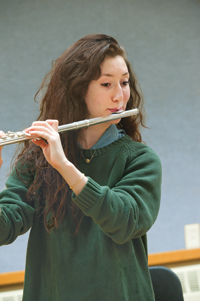 For professional performers there are fewer positions available than there are musicians eager and qualified to fill them, so competition in the form of auditions is the fairest way to determine which of the applicants is best suited for a particular job. This type of competition improves the performance standards of orchestras, and students who aspire to this level should be keenly aware of how competitive the field of professional performing is, and how much work is required to enter this arena.
For professional performers there are fewer positions available than there are musicians eager and qualified to fill them, so competition in the form of auditions is the fairest way to determine which of the applicants is best suited for a particular job. This type of competition improves the performance standards of orchestras, and students who aspire to this level should be keenly aware of how competitive the field of professional performing is, and how much work is required to enter this arena.
When competition is used for other purposes, for example as a way of motivating young students, it can have long-term negative consequences. This type of competition can produce quick results – everybody likes gold stars – but it supplants more lasting benefits gained when students learn to evaluate their own work. By assigning labels of winner and loser or numerical rankings, competition provides quick, unambiguous results. Much of musical learning, however, requires skills that are complex, nuanced, and far from objective. The short-term excitement of winning a prize often leads to a long-term dependency on adults and other authority figures for praise and direction. It is not necessary for young students to outdo one another in order to do their best work.
Young students need guidance as they learn to evaluate their own work. Acquiring the skills of effective, self-motivated practice takes a long time. Teachers of young students develop a repertoire of practice strategies that provide a structure of immediate reinforcement as students gradually learn self-discipline. The goal, however far in the future it may be, is internally motivated practice.
To better understand my students’ motivation for playing the flute and practicing, I asked them to respond to three questions: Why did you decide to play the flute rather than another instrument? What do you enjoy most about playing your flute now? and What motivates you to practice? I instructed each student to think carefully and honestly about her responses, and to write her own thoughts, not what she thought I would like to hear.
Most of the answers to the first question were something like “I love the sound of the flute.” I want my students to continue to love the sound of the flute, so I assign tone studies and exercises that help them develop more expressive sounds and repertoire that uses their developing abilities.
Many of the answers to the second question reflected students’ enjoyment of learning challenging music. The idea of improving one’s own skills and using these skills in performance motivates even the youngest students. The message to me is again to choose repertoire carefully. They want to be stretched and challenged.
The students’ responses to the third question showed that they understand the long-term benefits of careful practice. Some mentioned wanting to be well-prepared for their next lesson; while others wrote of wanting to play first chair in high school. A few were thinking of playing in a band in college. One student, a section leader, mentioned her responsibility to be able to teach other flutists; another expressed a broader goal “to be an amazing musician.”
Reading these thoughts reminded me of the responsibility teachers have to nourish students’ dreams, however modest they may be. I also felt a renewed commitment to teach my students how to produce a beautiful tone, so that they can find their own inspiration each time they play.
Students know about competition. They are familiar with it in sports, job searches, beauty pageants, and even in their social circles. Part of growing up is learning to distinguish between when competition is necessary for the smooth running of society and when it is being used to substitute for a deeper, more meaningful challenge. Many students know about the dark side of competition from participation in solo-ensemble festivals in which teachers have convinced them that the rating they receive is more important than what they learn or the pleasure they feel when they perform.
After these festivals I often remind my students of the real reasons for performance, which do not include receiving a higher rating than somebody else. The positive aspects of graded festival performance, such as the challenge of meeting a performance deadline, the thrill of playing with others in chamber music events, the stimulation of hearing peers perform, and the sometimes humbling lessons of receiving suggestions from an adult other than a student’s own teacher, are too often lost in the tallying of scores and ratings.
My desire to remove unnecessary competition from my students’ music-making could be interpreted as a weakening influence on them, an effort to protect them from the real world of hard knocks. I think that in fact a student gains strength by learning how to recognize her own mistakes and how to use them to improve her next effort. I believe that students who can confidently judge their own performances gain a sense of self-worth that is missing when praise comes only from outside. When a student understands how to direct her own study, and how to build on her own curiosity and enthusiasm, the inevitable hard knocks will not be insurmountable obstacles.
Another, more positive, facet of the spirit of competition is competition with ourselves. This allows us to use the motivating energy of competition without having to outdo anyone else. This sort of internal motivation is a useful skill because it does not rely on an outside judge; we have to make our own decisions about the results of these internal contests. Sometimes it is easy to design such a contest: I will try to play all the major scales with fewer wrong notes than I played yesterday. Sometimes it is harder to find a goal that can be defined and measured so easily. What if our intent is to play more expressively or with greater tonal variety? These are worthy goals even if they are subject to various interpretations. I encourage students to use easy-to-measure goals when they are appropriate but to recognize that the real challenges and rewards often lie in the realm of the unmeasurable.
As musicians, the underlying goal should always include playing for one’s own enjoyment. From the youngest flute student to the most seasoned orchestral musician, if playing is not enjoyable, they should find something else to do that is more satisfying. Professional players who can make a living performing are lucky indeed; they are paid to do work that they love. Amateur musicians are fortunate as well – music is an honorable, intellectually rewarding, environmentally conscious, socially stimulating way to spend leisure time. Students may end up as professional musicians or they may not, but either way they can look forward to the enjoyment of making music.
The following is a list of goals to consider, as teachers and as performers, about the role of competition.
• Celebrate being able to play for your own enjoyment.
• Prepare students who aspire to be professional performers to face competition in a mature, healthy way.
• Teach students to recognize and understand the difference between necessary and inappropriate uses of competition as a motivator.
• Equip students with the skills and self-awareness they need to practice effectively and to participate in musical events without resorting to inappropriate competition or the negative attitudes it fosters.
Thanks to Alyson, Deanna, Gina, Morgan, Alicia, and Meghan for their help with this article.






